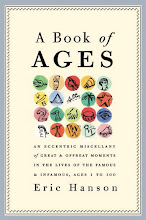On May 7, 1824, Beethoven conducted the first performance of his Ninth Symphony. The setting: Vienna’s Kartnertor Theater. The orchestra and soloists were told to ignore the composer and instead follow the count of the assistant conductor. Beethoven was, by this time, completely deaf and couldn't hear the orchestra or the applause. Despite the packed house he lost money on the night. Beethoven appears on pages 187 and 211 in A Book of Ages.
Composers Johannes Brahms and Pyotor Ilich Tchaikovsky were both born on this date, Brahms in Germany, in 1833, Tchaikovsky in 1840, in Russia. Tchaikovsky appears in four anecdotes in A Book of Ages.
It's the birthday of Robert Browning, born in 1812, in suburban London. On January 10, 1845, he sent a rather chaste love note to Elizabeth Barrett, beginning one of the great love affairs of the Post Romantic era. He was 32 and ordinary looking. She was 38 and plain. He was energetic and active. She was a semi-invalid, living like a prisoner in her father's house on Wimpole Street. But they were both poets, she, arguably, the better one. They eloped to Italy in the following year, settling in Pisa and then in Florence. They appear five times in A Book of Ages.
The great racehorse, Seabiscuit, died on this date in 1947, of an apparent heart attack, six days short of his fourteenth birthday. His greatest moment came in 1938 when the one-in-four underdog beat War Admiral at Pimlico. Forty million people listened to the two-horse race on the radio. In December of that year he was named one of the top newsmakers of the year, along with FDR and Adolf Hitler. Seabiscuit was a lifelong bachelor. He appears on pages 3, 5, 9 and 30 in A Book of Ages.
Thursday, May 7, 2009
Beethoven, The Brownings, Seabiscuit
Labels:
Beethoven,
birthday,
Brahms,
Elizabeth Barrett,
Robert Browning,
Seabiscuit,
Tchaikovsky
Subscribe to:
Post Comments (Atom)





No comments:
Post a Comment